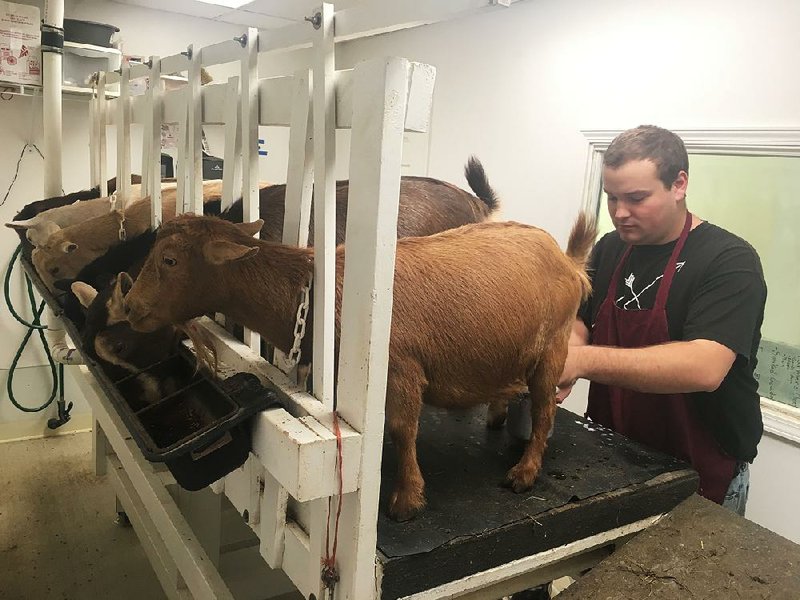Like most farmers this time of year, the McCormicks are winding down; their goats won't give milk during the cold months and fewer outdoor markets are open.
For years they've sourced several sorts of goat cheeses -- chevre, halloumi, ghouda, feta -- to nearby grocery stores, restaurants and farmers markets in Northwest Arkansas. But Tessa McCormick, 45, owner of White River Creamery, said they've decided to cut their wholesale production temporarily and open their own retail store.
They want to see how well they can do on their own, spending less time running a 24/7 dairy and a creamery, and more time enjoying their farm near the White River near Elkins, she said.
Established in 2011, White River Creamery is the only goat dairy certified in the state by the U.S. Department of Agriculture. With about 100 goats -- roughly half of them "milkers" -- the creamery produces about 200 pounds of cheese per week.
"Which isn't a lot," McCormick is quick to say.
Scott McCormick, 46, learned the delicate craft from the Vermont Institute of Artisan Cheese, (which doesn't offer classes as of four years ago). As a former math and science teacher, he liked the process each batch went through. Depending on what constraints are put on the base -- goat's milk -- the maker can end up with several outcomes, he said.
"I like it because it's a challenge," McCormick said.
Before devoting their lives to making cheese and raising Nigerian Dwarfs, a goat breed with high butterfat levels, the McCormicks had a life in California. A fire destroyed the McCormicks' home there, and while it didn't collapse, there was significant mold damage, meaning they couldn't resell the property, Tessa McCormick said. The insurance brokers offered the family a tenth of the home's original value.
Fiscal strain, stress and illness led the couple to Arkansas.
Sitting on a rock, Tessa McCormick somberly said "God's timing is hilarious."
"If I knew now what it took to become a farmer, I don't think we ever would have done it," she said.
Her mother once raised red jersey cows in Arkansas, and after visiting friends, McCormick told her family she wanted to move there; it felt right.
In spite of initially knowing nothing about cheese production, they've received calls from New York-based cheese purveyors Murray's on how they could get their products in Kroger stores. Murray's has an agreement with Kroger to expand the grocery chain's cheese selection.
Up a winding dirt road at the farm is a 400-gallon vat that would expand their production capacity 13-fold. At that point, Tessa McCormick said they'd buy cows. The amount of milk produced from 15 goats is worth about one cow.
"Right now there are a lot of different variables up in the air," she said, regarding the future of their farm. "We're waiting on like four grants."
In spring, when the status of the grants is determined, the McCormicks said they will decide what's next. Along with the creamery chores, they conduct tours of their 17-acre farm and dairy and -- with the new store -- tourists are now able to buy cheese fresh from the farm, 9 a.m. to 3 p.m. Wednesdays and Saturdays.
Their products are served in Little Rock at restaurants such as The Root Cafe and Big Orange. Northwest Arkansas shoppers can find them at farmers markets, Whole Foods and Ozark Natural Foods.
SundayMonday Business on 11/12/2017
